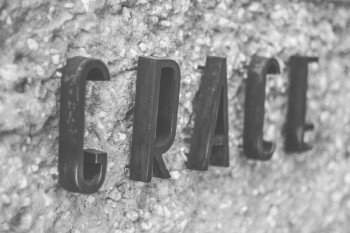I’m not a sentimental person. I’ve felt a little perplexed when I’ve seen people mourn the loss of a pet. In my 33 years, I’ve had many pets: some I’ve given away, some have run away, and a few have died. Just since our family has been here in Cameroon, we’ve lost three adult cats, three kittens, a Western Tree Hyrax, and most recently a tortoise named Jack. I was sad to see them go, especially the ones that died. Sad because I knew this is the effect of sin in our world. Sad because I knew my wife would miss them. But as sad as I was, their death didn’t affect my life too much.
Until a Bakoum man came to my door.
Unexpected Response
I didn’t know him, and I wasn’t expecting any visitors. He only spoke to me in Bakoum—the language of the local people—which was hard since I had no idea what topic he was addressing, and my Bakoum is still on the developing end of things.
As he continued, I understood he was talking about a dog and describing where he lived. “I already have a dog,” I explained. After a few minutes, though, I understood what he was saying: A dog had been hit by a car in front of his house, and he thought it was mine.
My first reaction was to deny it could have been my dog. There are tons of dogs around here, and they are often in the road. But he said this one had a brown collar, and no dogs have collars here except mine.
We drove over to his house in my car. And there, lying under a tarp was my dog, Rachat. Rachat whom I’d purchased from an abusive owner. Rachat whom I’d nursed back to health. Rachat whom I’d defended from my neighbors who threatened him with machetes. Rachat who followed me everywhere I went.
He was a good dog. He lay there intact, thankfully, but was clearly dead. I figured I would mourn him later. So I grabbed two paws and asked the man who had found me to grab the other two to put him in my car.
That was when the yelling began.
What are you going to do with him? You’re not going to bury him, are you? You know we eat dogs here, right? We came and got you; you should leave him with us! At least give us a thigh! Don’t you understand Bakoum? Why are you not responding?
I did understand. I was just ignoring them. The finder wouldn’t let me go, however, until I assured him he would get his share of the meat if I decided not to bury Rachat.
From Beloved Friend to Neighbor’s Dinner
By way of disclaimer, not everyone in Cameroon eats dogs. It seems to me it mainly happens in villages, and it could just be in my region. I don’t expect my experience represents all of Cameroon, let alone all of Africa.
The idea of eating dogs is probably shocking to many of us, but it’s normal where I live. My neighbors think of dogs like farmers think of chickens. They keep them around, caring for and feeding them until it’s time to eat them. Did you know they eat horses in France? And the French think it’s funny we consider horses to be different from cows. I consider eating dogs to be one of those “not good, not bad, just different” things about Cameroon.
I returned to my neighborhood with Rachat and told the news to my family, who were profoundly sad, and to my neighbors, who were sympathetic. After weighing our options, we decided to give Rachat’s body to one of our neighbors in exchange for a puppy.
Yep, Rachat went from being my beloved friend to my neighbor’s dinner in a matter of hours.
How could you do that? some of you are no doubt asking. Not without tears. But there are many factors to consider. One is that my neighbors don’t get enough protein, and most of the kids are suffering from malnutrition. They do eat dogs, and they need the meat. For me to bury Rachat would be a statement that I don’t care about them and that I’m so rich I take the luxury of burying valuable necessities. Also, I’ve heard on more than one occasion that when Westerners have buried their dogs, they’ve been dug up at night. Somehow that seemed worse to me.
Unexpected Sacrifice
When asked about the sacrifices he’d made as a missionary, it’s reported David Livingstone replied, “I never made a sacrifice.” In light of Christ’s sacrifice for us, I understand what he means. Besides, everything belongs to God. The Lord gives, and the Lord takes away. In reality, though, there is a cost. I’d freely give away a thousand dogs to see one Bakoum saved, but that doesn’t mean we ought to consider our sacrifices as trivial or nonexistent.
When I thought about the sacrifices I would have to make in order to be a missionary, I thought about safety, air conditioning, and fighting snakes. But I’ve found that the greatest sacrifices have been things I would’ve never imagined. In one sense, giving away the body of an already dead dog was nothing. But in another sense, I feel like the offended neighbor in the parable Nathan used to confront David (2 Sam. 12). All that was was taken from him was a single lamb. But for him it wasn’t just a lamb. It was a lamb that grew up with his kids and ate of his food. It was like a daughter to him.
During my time in Cameroon, there have been many times I’ve felt uneasy, out of place, and unable to communicate. It was so nice to have Rachat by my side in those moments. He was always glad to see me. I could speak to him in English (though he’d ignore my commands regardless of the language I spoke), and I could have fun with him. Rachat was one of those graces that are few and far between around here—a little refuge of joy. His death hit me hard—even harder than it hit my kids. I miss him.
My neighbor approached me a couple days after the whole incident. He thanked me and said the meat gave him the energy to work hard in the field, and he was thankful to God. While I don’t think he understood what giving him Rachat cost me, he knew it had been an expression of love. Looking back, I see this was one of those opportunities I would’ve never anticipated—or desired—in which to love my neighbor like Jesus.
I wouldn’t say losing Rachat wasn’t a sacrifice, but I’d say it was worth it.





